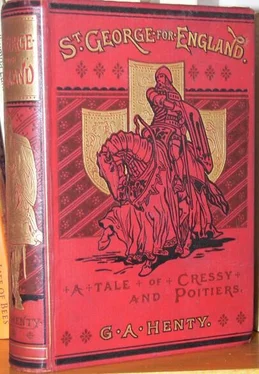G. Henty - St. George for England - A Tale of Cressy and Poitiers
Здесь есть возможность читать онлайн «G. Henty - St. George for England - A Tale of Cressy and Poitiers» весь текст электронной книги совершенно бесплатно (целиком полную версию без сокращений). В некоторых случаях можно слушать аудио, скачать через торрент в формате fb2 и присутствует краткое содержание. Жанр: Старинная литература, на английском языке. Описание произведения, (предисловие) а так же отзывы посетителей доступны на портале библиотеки ЛибКат.
- Название:St. George for England: A Tale of Cressy and Poitiers
- Автор:
- Жанр:
- Год:неизвестен
- ISBN:нет данных
- Рейтинг книги:3 / 5. Голосов: 1
-
Избранное:Добавить в избранное
- Отзывы:
-
Ваша оценка:
- 60
- 1
- 2
- 3
- 4
- 5
St. George for England: A Tale of Cressy and Poitiers: краткое содержание, описание и аннотация
Предлагаем к чтению аннотацию, описание, краткое содержание или предисловие (зависит от того, что написал сам автор книги «St. George for England: A Tale of Cressy and Poitiers»). Если вы не нашли необходимую информацию о книге — напишите в комментариях, мы постараемся отыскать её.
St. George for England: A Tale of Cressy and Poitiers — читать онлайн бесплатно полную книгу (весь текст) целиком
Ниже представлен текст книги, разбитый по страницам. Система сохранения места последней прочитанной страницы, позволяет с удобством читать онлайн бесплатно книгу «St. George for England: A Tale of Cressy and Poitiers», без необходимости каждый раз заново искать на чём Вы остановились. Поставьте закладку, и сможете в любой момент перейти на страницу, на которой закончили чтение.
Интервал:
Закладка:
Vannes, an important town, and Carhaix quickly surrendered, and the French force was daily receiving considerable reënforcements. This arose from the fact that large numbers of French nobles and knights had, with their followers, taken part with Alfonso, King of Castile and Leon, in his war with the Moors. This had just terminated with the expulsion of the latter from Spain, and the French knights and nobles on their way home for the most part joined at once in the war which their countrymen were waging in Bretagne.
Seeing the great force which was gathering for a fresh siege of Hennebon, Sir Walter Manny and the Countess of Montford sent an urgent message to King Edward for further support. The king was not yet ready, but at the beginning of August he dispatched a force under the command of the Earl of Northampton and Robert of Artois. It consisted of twenty-seven knights bannerets and 2,000 men-at-arms. Before, however, it could reach Hennebon the second siege of that city had begun. Charles of Blois had approached it with a far larger army than that with which he had on the first occasion sat down before it. Hennebon was, however, much better prepared than at first for resistance. The walls had been repaired, provisions and military stores laid up, and machines constructed. The garrison was very much larger, and was commanded by one of the most gallant knights of the age, and the citizens beheld undaunted the approach of the great French army.
Four days after the French had arrived before Hennebon they were joined by Don Louis, who had been severely wounded in the fight near Quimperlé, and had lain for six weeks at Rennes. Sixteen great engines at once began to cast stones against the walls, but Sir Walter caused sand-bags to be lowered, and so protected the walls from the attack that little damage was done. The garrison, confident in their powers to resist, taunted the assailants from the walls, and specially enraged the Spaniards and Don Louis by allusions to the defeat at Quimperlé.
So furious did the Spanish prince become that he took a step unprecedented in those days of chivalry. He one morning entered the tent of Charles of Blois, where a number of French nobles were gathered, and demanded a boon in requital of all his services. Charles at once assented, when, to his surprise and horror, Prince Louis demanded that two English knights, Sir John Butler and Sir Hubert Frisnoy, who had been captured in the course of the campaign and were kept prisoners at Faouet, should be delivered to him to be executed. "These English," he said, "have pursued, discomforted, and wounded me, and have killed the nephew whom I loved so well, and as I have none other mode of vengeance I will cut off their heads before their companions who lie within those walls."
Charles of Blois and his nobles were struck with amazement and horror at the demand, and used every means in their power to turn the savage prince from his purpose, but in vain. They pointed out to him that his name would be dishonored in all countries where the laws of chivalry prevailed by such a deed, and besought him to choose some other boon. Don Louis refused to yield, and Charles of Blois, finding no alternative between breaking his promise and delivering his prisoners, at last agreed to his request.
The prisoners were sent for, and were informed by Don Louis himself of their approaching end. At first they could not believe that he was in earnest, for such a proceeding was so utterly opposed to the spirit of the times that it seemed impossible to them. Finding that he was in earnest they warned him of the eternal stain which such a deed would bring upon his name. The Spaniard, however, was unmoved either by their words or by the entreaties of the French nobles, but told them that he would give them a few hours to prepare for death, and that they should be executed in sight of the walls after the usual dinner hour of the army.
In those days sieges were not conducted in the strict manner in which they are at present, and non-combatants passed without difficulty to and fro between town and camp. The news, therefore, of what was intended speedily reached the garrison, whom it filled with indignation and horror. A council was immediately called, and Sir Walter Manny proposed a plan, which was instantly adopted.
Without loss of time Almeric de Clisson issued forth from the great gate of Hennebon, accompanied by 300 men-at-arms and 1,000 archers. The latter took post at once along the edge of the ditches. The men-at-arms rode straight for the enemy's camp, which was undefended, the whole army being within their tents at dinner. Dashing into their midst the English and Breton men-at-arms began to overthrow the tents and to spear all that were in them. Not knowing the extent of the danger or the smallness of the attacking force, the French knights sprang up from table, mounted, and rode to encounter the assailants.
For some time these maintained their ground against all assaults until, finding that the whole army was upon them, Almeric de Clisson gave order for his troop to retire slowly upon the town. Fighting every step of the ground and resisting obstinately the repeated onslaught of the French, Clisson approached the gate. Here he was joined by the archers, who with bent bows prepared to resist the advance of the French. As it now appeared that the garrison were prepared to give battle outside the walls, the whole French army prepared to move against them.
In the mean time Sir Walter Manny, with 100 men-at-arms and 500 horse archers, issued by a sally-port on the other side of the town, and with all speed rode round to the rear of the French camp. There he found none to oppose him save servants and camp-followers, and making his way straight to the tent of Charles of Blois, where the two knights were confined, he soon freed them from their bonds. They were mounted without wasting a moment's time upon two spare horses, and turning again the whole party rode back toward Hennebon, and had reached the postern gate before the fugitives from the camp reached the French commanders and told them what had happened.
Seeing that he was now too late, because of De Clisson's sortie, Charles of Blois recalled his army from the attack, in which he could only have suffered heavily from the arrows of the archers and the missiles from the walls. The same day, he learned from some prisoners captured in the sortie, of the undiminished spirit of the garrison, and that Hennebon was amply supplied by provisions brought by sea. His own army was becoming straitened by the scarcity of supplies in the country round; he therefore determined at once to raise the siege, and to besiege some place where he would encounter less serious resistance.
Accordingly next morning he drew off his army and marched to Carhaix.
Shortly afterward the news came that the Earl of Northampton and Robert of Artois, with their force, had sailed, and Don Louis, with the Genoese and other Italian mercenaries, started to intercept them with a large fleet. The fleets met off the island of Guernsey, and a severe engagement took place, which lasted till night. During the darkness a tremendous storm burst upon them and the combatants separated. The English succeeded in making their way to Brittany and landed near Vannes. The Spaniards captured four small ships which had been separated in the storm from their consorts, but did not succeed in regaining the coast of Brittany, being driven south by the storm as far as Spain. The Earl of Northampton at once laid siege to Vannes, and Sir Walter Manny moved with every man that could be spared from Hennebon to assist him.
As it was certain that the French army would press forward with all speed to relieve the town, it was decided to lose no time in battering the walls, but to attempt to carry it at once by assault. The walls, however, were so strong that there seemed little prospect of success attending such an attempt, and a plan was therefore determined upon by which the enemy might be thrown off their guard. The assault commenced at three points in the early morning and was continued all day. No great vigor, however, was shown in these attempts, which were repulsed at all points.
Читать дальшеИнтервал:
Закладка:
Похожие книги на «St. George for England: A Tale of Cressy and Poitiers»
Представляем Вашему вниманию похожие книги на «St. George for England: A Tale of Cressy and Poitiers» списком для выбора. Мы отобрали схожую по названию и смыслу литературу в надежде предоставить читателям больше вариантов отыскать новые, интересные, ещё непрочитанные произведения.
Обсуждение, отзывы о книге «St. George for England: A Tale of Cressy and Poitiers» и просто собственные мнения читателей. Оставьте ваши комментарии, напишите, что Вы думаете о произведении, его смысле или главных героях. Укажите что конкретно понравилось, а что нет, и почему Вы так считаете.












